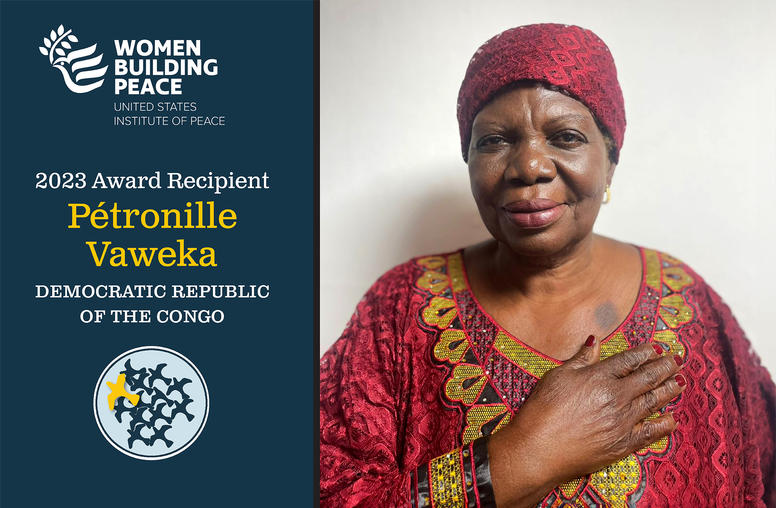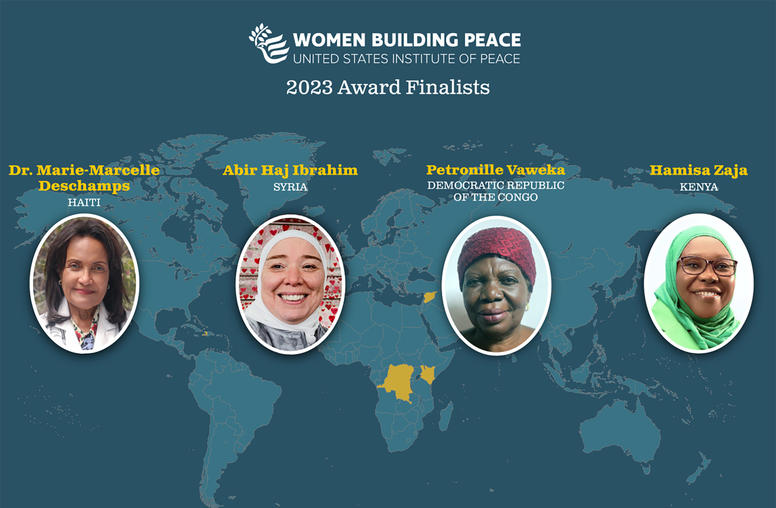Eye of the Hurricane: Liberia and Instability in West Africa
Newsbyte looks at highlights from recent Institute briefing.
WASHINGTON--"The cancer that has afflicted West Africa throughout the 1990s continues to spread. The Ivory Coast is just the most recent state to fall victim to violent instability in what now appears to be a civil war." With these sobering words Chester A. Crocker, chairman of the Board of Directors at the U.S. Institute of Peace, introduced the most recent development in the unfolding West African regional war at a December 9, 2002 Current Issues Briefing at the Institute of Peace titled, "Eye of the Hurricane: Liberia and Instability in West Africa."
Moderated by Crocker, the discussion featured regional experts William M. Bellamy, principal deputy assistant secretary of state for African affairs; former Liberian president Amos C. Sawyer; and Ellen Johnson Sirleaf, chairman and CEO of Kormah Investment and Development Corporation and leader of the opposition Unity Party of Liberia.
This public event was the most recent effort by the Institute of Peace to shed light on the violent conflicts threatening the entire West African region (see "Responding to War and State Collapse in West Africa," United States Institute of Peace, Special Report no. 81, January 2002).
More than 100 guests gathered to listen to the speakers and to engage in a robust discussion about the roots of the region's problems and possible pathways to peace.
Liberia: "A Dysfunctional, Autocratic Kleptocracy"
As Sirleaf points out, "Liberia today is aptly described as a dysfunctional, autocratic kleptocracy" ruled through "a dual system of patronage and intimidation." The devastating civil war and five years of rule by President Charles Taylor have led to appalling conditions in Liberia, which is now almost devoid of electricity, running water, and functioning clinics and schools.
While there is no accurate measure of the socio-economic conditions in Liberia (because the regime does not report human development statistics), gross domestic product per capita has plummeted since the 1980s, noted Sirleaf, leading to hellish living conditions that are compounded by the regime's frequent human rights abuses. Reflecting on a recent visit to Monrovia, Sirleaf underscored the depth of hardship and abuse perpetrated on the people by the Liberian government:
Under the panoply of poverty lives a small class that lords over the rest of the population with a callous insensitivity to how people are living. They [go as far as to] abduct children off the street, give them drugs, guns and force them into combat.
Liberia: "The Epicenter of the West African Conflict System"
The bloody conflicts, which started in Liberia in 1989, spread to Sierra Leone in 1991, to Guinea in 2000 and are now ravaging the Ivory Coast, have devastated a once peaceful West African region. At the center of this conflict system is Liberia's warlord president, Charles Taylor. "Liberia isÉthe bridge linking conflicts across the region," explained Sawyer.
Characterizing the Liberian regime as a "gang" and its president as the "gang leader," Bellamy suggested that Taylor and his cabal thrive on conditions of instability and thus attempt to spread chaos across the region, weaken governing structures, and subsequently generate new flows of revenue for the regime through violence and plunder. In the past Taylor has used this strategy to the north, in Sierra Leone, where during the 1990s he sponsored the Revolutionary United Front (RUF), which in turn brutalized the Sierra Leonean population while providing a steady stream of "conflict diamonds" to Monrovia.
Currently, the Taylor regime is looting Liberia's natural resources, such as by granting huge concessions of rain forest to unscrupulous foreign timber companies, noted Sirleaf.
Regional Dimensions of the Current Conflict in West Africa
The 15-state region, with its nearly 240 million inhabitants, is one of the poorest on earth and contains all the ingredients of further hardship and spreading anarchy. Discussing the importance of stability in West Africa to the United States, Sawyer said it was time for policymakers in Washington to "put West Africa on the front burner."
Furthermore, Crocker pointed out that the "downward spiral of events in West Africa must be stopped lest the entire region fall further into chaosÑwhich as we know now, is the preferred environment of our terrorist enemies."
On this same point, Sirleaf added that Taylor will benefit most from the new fighting in Ivory Coast. "We saw [the war in Ivory Coast] coming and told people. Give a year and Ghana will be in trouble too. That cancer will spread. We've got to get all terrorists, big and small."
A Way Forward
Panelists offered a number of concrete approaches to deal with the Taylor regime, and to put the region on a path to peace.
Underscoring the need to completely remove Charles Taylor from any transitional process in Liberia, Sawyer strongly warned against electoral false startsÑunfair contests that unwittingly provide Taylor with legitimacy. Sawyer also called for:
- The deployment of a West African stabilization force that could re-establish security in Liberia and usher in an interim government, for a period of perhaps two years.
- Advocacy work that will raise international awareness and political will to confront the profound problems in West Africa that pose threats to the region and the greater world community.
- Liberians in the diaspora to overcome their differences and begin to work constructively and in concert toward the end of the Taylor regime.
Sirleaf echoed Sawyer's recommendations and highlighted:
- The moral necessity for all Liberians to find the courage to take action and to condemn the Taylor regime, and to help hasten an end to the current abuses being perpetrated upon Liberians.
- The imperative facing West Africa's leaders to speak the truth about, and condemn the criminal nature of, the Taylor regime.
- The importance of a Taylor indictment at the on-going war crimes tribunal in Freetown.
Bellamy focused his recommendations on four areas where the United States is working to contain and mitigate the negative affects of the Taylor regime:
- Sanctions should not be relaxed on the regime, indeed they must be sustained at a time when they are beginning to hurt Taylor.
- The democratic opposition within Liberia must be empowered, taking into account that further democratic activity in Liberia must not give legitimacy to Taylor or produce another electoral false start.
- Human rights violations must be stopped.
- Timber, maritime, and diamond revenues must be kept out of the hands of Taylor and made transparent lest they prolong the regime's tenure.
The views summarized here reflect the discussion at the meeting; they do not represent formal positions taken by the Institute, which does not advocate specific policies.

